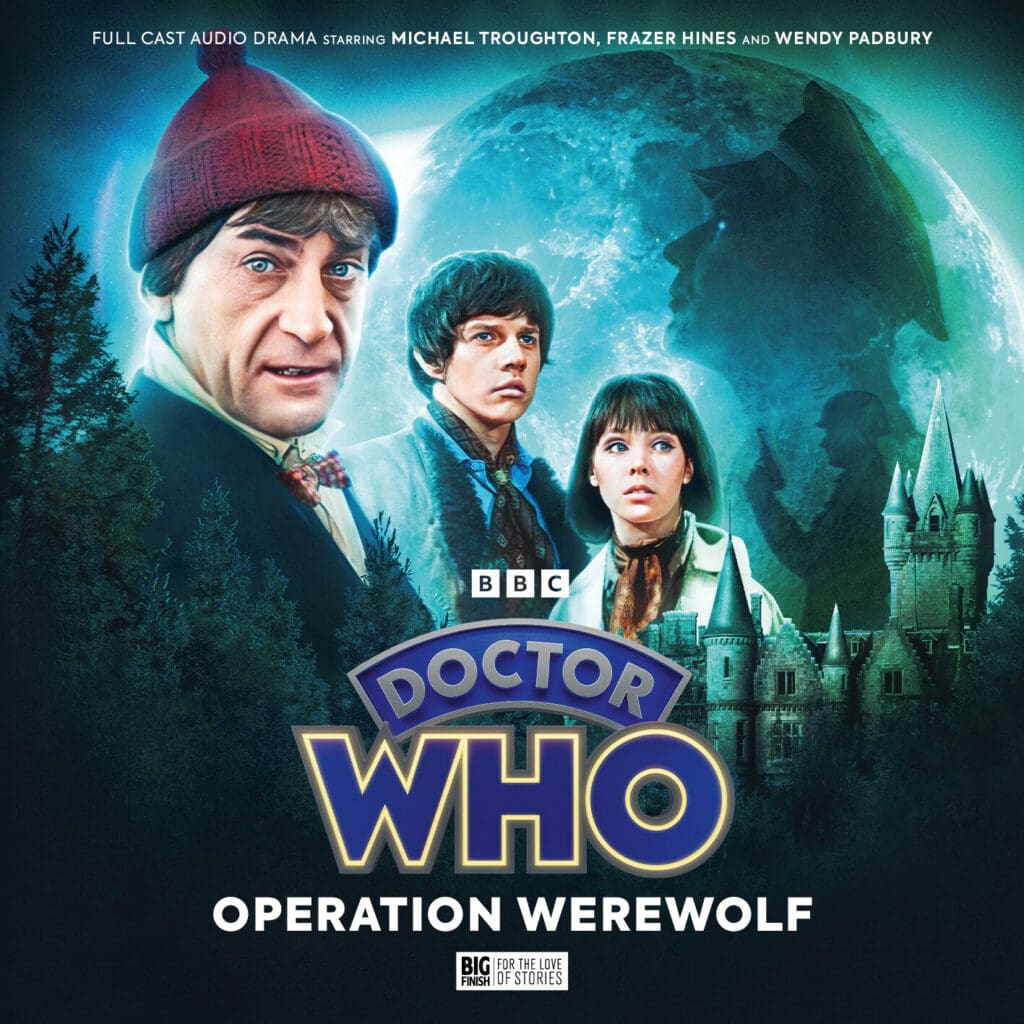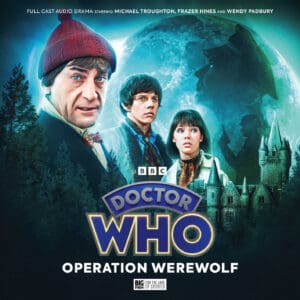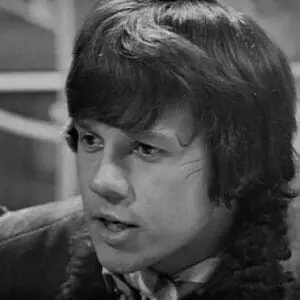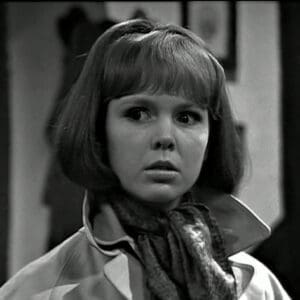
The Lost Stories
Operation Werewolf
Sets:
The Lost Stories
Reviews and links from the Community
Review of Operation Werewolf by WeAreInACar
This is a lost story that delivers; possibly better on audio than it would have on screen. Sadly, there are no werewolves; but an entertaining adventure based around the war which didn't suffer at its six episode length.
Whilst some "alternative players" brought in by Big Finish are less strong than others, Michael Troughton excels as the second Doctor.
Review of Operation Werewolf by Shayleen
The Lost Stories is one of Big Finish's most interesting ranges. Audio adaptions of proposed story's that never made it to screen, after listening to some you can see why, whereas others are excellent and a glimpse of what could have been. Operation Werewolf is one of these strong entries. This is a true Second Doctor story, full of era appropriate tropes but combining with the well told and performed story to make a delightful listen. Michael Troughton thoroughly inhabits his father's role, capturing his mannerisms and vocal tone so very sell. Hines and Padbury are still wonderful as Jamie and Zoe, nearly 60 years on but still imbued with a youthful energy for these characters. Even at 6 episodes I did not find this story dragging, it flew by for me. This is simply a solid, wonderful piece of Second Doctor storytelling, it doesn't offer any surprise cameos or crossovers or do anything revelatory, but it delivers the Troughton era at it's best and I would thoroughly recommend it to anyone seeking a strong Second Doctor story or just a solid piece of Doctor Who in general.
This review contains spoilers
Review of Operation Werewolf by PalindromeRose
Doctor Who – The Lost Stories
#8.02. Operation Werewolf ~ 8/10
◆ An Introduction
My attitude towards this range has soured over the past five years, probably because we’ve endured several appallingly awful adventures, and one cash-grab which thoroughly butchered ‘Genesis of the Daleks’. Instead of throwing Briggsy to the wolves for sacrilege, the collective fanbase have allowed him one last chance to redeem himself. That would explain why this range has finally released two genuine lost adventures, for what feels like the first time in aeons!
That Dick Sharples disaster aside, the Second Doctor has got a relatively clean track record in this range. I don’t know about you lot, but I think a historical adventure tapping into the D-Day landings sounds like a marvellous way to kill the next three hours…
◆ Publisher’s Summary
The TARDIS has brought the Doctor, Jamie and Zoe to Normandy in France, not in 1066 as intended, but in 1944, three days before the Allies are due to launch the D-Day landings.
Joining forces with French partisans, they learn that the Germans have been conducting secret experiments at a nearby château. These experiments form part of a plan that German high command believe will enable them to win the Second World War. The name of that plan? Operation Werewolf.
◆ The Second Doctor
This incarnation has always had something of the Cowardly Lion about him, but that’s part of the charm. Confused with an expert physicist from England, he finds himself in the company of an eccentric scientist… who’s thankfully nowhere near as barmy as Professor Zaroff! The Doctor is soon blackmailed into helping him iron out some of the flaws with his experiment, otherwise one of the French partisans will die in a teleportation accident. He spends a large chunk of the runtime with said partisan, a woman by the name of Françoise: they actually develop quite a good rapport with each other.
Despite owning the first two volumes, I’ve been avoiding the ‘Second Doctor Adventures’ range for numerous reasons… but mainly because I’ve been so unsure of Michael Troughton taking over his late father’s role. Having completed ‘Operation Werewolf’, I honestly had nothing to worry about. His performance is damn near perfect in this release!
The reason he’s so keen to see William the Conqueror is history. Why read about it when you can live it? He also suspects that the Bayeux Tapestry contains a number of factual errors, and wants to check for himself. The Doctor tells Kommandant Müller that sometimes it takes more courage not to fight. He’s clearly impressed with Richter’s experiments, but can’t hide his disgust at the fact someone was killed during the demonstration. He refuses to help cold-blooded killers win the war with teleportation.
◆ Jamie McCrimmon
Listening to him banter on with the Doctor during those early scenes was genuinely delightful! I’d completely forgotten about their stellar bromance. Jamie receives some rather interesting material in ‘Operation Werewolf’, because he seemingly encounters one of his descendents. He gets on incredibly well with Fergus, and they become all the more friendly once the truth is revealed: take a drink every time Jamie mentions being his great grand uncle!
Remember when ‘Beyond War Games’ was first announced and everyone believed Frazer Hines had retired? That certainly rattled my cage, but thankfully, he appears to be sticking around for the foreseeable. He delivered a brilliant performance in this adventure.
Railways are long after his time, but he’s seen them underground and at Vaughn’s place. Jamie suggests mounting a rescue operation to save a captured English scientist, because the resistance members can’t just do nothing, they have to at least try.
◆ Zoe Heriot
Our resident genius gets barely any material until the end of episode three, where she gets brainwashed into becoming a loyal supporter of the Nazis! Jonathan Morris needed to handle this storyline with the utmost of care, in order to avoid being crucified on social media for doing something incredibly insensitive. Brainwashed or not, having one of the most beloved companions from the black and white era giving a Nazi salute feels more than a step too far. I can see this creative decision going down like a lead balloon!
Listening to this adventure reminded me of a very close friend who I constantly compare with Wendy Padbury, mainly cause she bears a striking resemblance to her. Tilly was suitably disgusted when I told her what happened to Zoe in this adventure, and I can’t say I blame her. Looking on the plus side, Padders put on a wonderful performance for ‘Operation Werewolf’.
She does know a little about the Second World War, which explains why hearing the date fills her with nothing but dread. Zoe’s place of work is the Parapsychology Library of Space Station W-3, in the 21st century.
◆ Wolf in Sheep’s Clothing
This adventure was always intended to be a pseudo-historical, so you may be shocked to learn that Werewolf was a bona fide operation undertaken by the Nazis.
In the waning months of 1944, as the Western Allies tightened their grip on Germany with rapid and relentless advances, a chilling undercurrent surfaced amidst the ruins of the Third Reich. Whispers spoke of a clandestine force emerging, one determined to defy the inevitable defeat that loomed over Nazi Germany. This covert group bore the ominous moniker the SS Werewolves.
Conceived in the recesses of Heinrich Himmler’s mind, the architect of the SS himself set one man for the job: Hans-Adolf Prützmann. The Werewolves were not to be dismissed as mere remnants of a crumbling regime. Instead they stood as a sinister and calculated strategy; a desperate gambit aimed at turning the tide during the dying days of the Third Reich.
Himmler, recognising the impending collapse, sought to create a force capable of sewing chaos and resistance long after the fall of the Nazi government. The SS Werewolves were not a conventional army: they were a shadowy network of highly trained and fanatically loyal individuals. Selected for their unwavering allegiance to the Third Reich and their ruthless determination, these operatives employed guerilla tactics behind enemy lines and engaged in acts of sabotage. Their mission was to instil fear, disrupt the advancing Allies, and maintain a semblance of influence even as the regime crumbled.
This clandestine taskforce was created during a time where an Allied victory seemed like a dead certainty, and the Nazis were going to make sure that their enemies would have nothing but chaos to deal with in the aftermath of the war. The SS Werewolves are a lesser-known aspect of the Second World War, which makes learning about them highly fascinating.
◆ Without a Trace…
Jonathan Morris noted that ‘Operation Werewolf’ features a science-fiction plot, but not one resulting from alien or time-traveller influence, which neatly leads me onto the topic of teleportation.
Nazi soldiers mastering the art of teleportation is a horrifying prospect. Imagine if they managed to sneak one of their transmat capsules into the cabinet war rooms, utilising spies to know every movement of the Allied war effort. Alternatively, they could’ve done something far more devastating and just eliminated the entire British command structure in one fell swoop.
The Doctor managed to put the kybosh on these plans with the assistance of some French partisans, but the potential consequences could’ve been catastrophic!
◆ Sound Design
Jamie Robertson created a stunning soundscape for ‘Operation Werewolf’. Normandy is crawling with jack-booted soldiers, who would happily execute resistance members on the spot. The château is their headquarters, where the deranged Professor Richter carries out his amoral experiments: how very Wolfenstein coded!
Hooting birds in the French woodland night, as the TARDIS materialises nearby. An aeroplane rumbles overhead… and is promptly shot down by Nazi operated AA batteries! Jack-booted soldiers begin scouring the woodland for prisoners of war, their guard dogs barking like mad. Gunshots echo through the trees. Soldiers can be heard marching around Müller’s outpost, clearly involved in some sort of training exercise. Richter’s transmat cabinets begin powering up; their activation is accompanied by pulsing waves of energy. Nazi troopers detonate gas cannisters at the resistance farmhouse in an attempt to choke them. Fluorescent lights click on and off as Richter begins his “ideological correction” experiments on Zoe and Pierre. The transmat cabinets explode… taking the château with them! Soldiers can be heard exchanging gunfire in the distance, as the Normandy Landings commence.
◆ Music
Something about Second World War stories brings out the best in composers, and Robertson is no exception. Despite being generally atmospheric, there are moments where percussion dominates the entire score, almost like how Normandy is being dominated under the jack-boot of the Nazi occupation.
◆ Conclusion
“The gas and lunar light will turn the Allied poodles into Nazi wolves.”
Teleportation experiments are well underway within a Normandy château, as members of the Third Reich make plans for a clandestine invasion of Great Britain! The scientist leading this operation has also discovered a way of brainwashing people, using a combination of lunar light and an experimental gas… allowing him to create loyal servants of the Nazis. With the historic Normandy Landings only three days away, the Doctor needs to move incredibly fast.
Submitted to the production office due to Camfield’s dismay at another sub-standard script, ‘Operation Werewolf’ was eventually shelved thanks to a combination of budget constraints and some sensitivity about the recent Second World War. That’s all rather unfortunate considering how entertaining it was.
The concept of the Third Reich gaining access to teleportation is horrifying. It almost certainly would’ve changed the outcome of the war, allowing them to sneak behind enemy lines and purloin classified information… or worse. They could just eliminate the entire Allied command structure in one fell swoop! This adventure takes a different approach, with the planned clandestine invasion of Great Britain. This somewhat mirrors the real life SS Werewolves: a shadowy network of highly trained and fanatically loyal individuals.
The performances have been great across the board, though I do have one complaint. I had trouble distinguishing between different German characters, routinely confusing Richter and Schneider. Our regulars were all marvellous though, Michael Troughton especially so!
While there are some aspects of ‘Operation Werewolf’ that made me clench my teeth in horror – like having one of the most beloved black and white era companions doing a Hitler salute – it feels fantastic to have a genuine ‘Lost Story’ again… rather than another pathetic attempt to sponge off of Tom Baker’s popularity! I’m really looking forward to ‘Deathworld’ now.
This review contains spoilers
Review of Operation Werewolf by MrColdStream
✅(8.13) = VERY GOOD!
Thworping through time and space, one adventure at a time!
This year's first of two Lost Stories is a scrapped six-part Season 6 story with Two, Jamie, and Zoe that would have occurred in Normandy right before D-Day in 1944. This is an ambitious story with a big cast, plenty of action, and an evocative wartime setting. Even though the Hartnell era abolished the practice, the adaptation features six individual episode titles.
The audio captures the WWII atmosphere well through sound design, performances, and writing. The Doctor and his friends are believed to be spies by the Germans occupying France. As the Doctor gets involved with the Germans and their secret projects (matter transmission and brainwashing technology), Jamie and Zoe ally themselves with the French resistance.
This is a historical adventure with no aliens and only minor sci-fi elements. The title may lead you to believe in the existence of actual werewolves in the story, but this is not the case. The name refers to the Nazi plan to use brainwashing technology to turn British and French soldiers into German wolf troops. It’s another crazy project undertaken by the Nazis during the war in a long line of them, as frequently explored in various pieces of media.
Jonathan Morris has adapted the original scripts by Douglas Camfield and Robert Kitts. The spirit of the era is very much present (the constant capture and escape; the mistaken identity plot strand; the Doctor having to help the baddies; the Nazis working with a high-ranking British official who backstabs everyone and turns out to be the main baddie; brainwashed companions), and the wonderful chemistry of my favourite TARDIS team is infectious, even without Patrick Troughton around. Michael Troughton is magically close to his late father in tone and mannerisms, and while Frazer Hines and Wendy Padbury don't exactly sound like their 60-years younger selves, they find that youthful tone nonetheless.
Probably my favourite aspect of the story is the little detail about the British doctor sent to France, named Fergus McCrimmon, who is revealed to be Jamie's descendant. The story dips in and out of their relationship occasionally, but ends on a positive note. This would have been an intriguing piece of characterization for Jamie.
It's a bit difficult to distinguish between the French and German characters, and the accents don't help. However, I generally enjoy Sir Aubrey and Bruckner, as they are quite clever and adept at uncovering details about the Doctor. Fergus also emerges as a remarkable character, particularly upon discovering his familial ties to Jamie.
As expected, the six-parter includes some typical padding and back-and-forth. If you listen to all six episodes at once, it can be challenging to keep track of everything, but if you know the era, you should be fine.
I love how the story ends the moment the D-Day invasion begins, and how the story goes full circle by finishing the same way it began.
RANDOM OBSERVATIONS:
- Funnily enough, the Doctor tried to land in 1066, which he last visited in The Time Meddler; isn’t he worried about running into his earlier self?
- This could have been the very first Doctor Who story set in WWII. In reality, we had to wait until the McCoy years to visit the period, during The Curse of Fenric.
- The Second Doctor and Jamie previously visited WWII with Ben and Polly during the Japanese invasion of Singapore (in the Companion Chronicles release The Forsaken). Funnily enough, it’s another story where one of the companions meets their family member.
- The Nazis' development of matter transmission cabinets bears a striking resemblance to Maxtible and Waterfield's creations in The Evil of the Daleks.
Community Ratings
(Updates coming soon:)
Add the last X members who rated it here
Add number of Favs, and who they are, here





